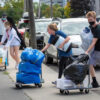
KJIPUKTUK (Halifax) – Canadian Voice of Women for Peace hosted a virtual-nation-wide Peace Camp in August 2020 that provided an opportunity to network with other passionate activists, learn about peace advocacy, and create social change within communities.
I attended from Kjipuktuk and here are some reflections.
Established in 2013, Peace Camps bring together young leaders and help them strategize to initiate peace-building projects within their communities. Through time, these peace camps have welcomed participants of all ages and now provide an essential space for intergenerational learning.
These days walking away from Peace Camp 2020 means to stand firm. Meeting through Zoom leaves our bodies in one place but our hearts travel, in my case on a journey of gratitude to the young women and those who identified as women who offered VOW Peace Camp 2020.
Feminism is experienced in the body, and my reflection today responds to moments when I felt and saw how the feminist path continues to mean questioning everything because everything needs to be questioned.
During the Feminist Toolkit workshop we responded to a Toolkit for Young Feminist to Build a Culture of Peace. The first resource mentioned was the “Harassmap an Egyptian initiative responding to the epidemic of sexual harassment as a collective response, literally mapping a city and marking the map where harassment took place in order to deter the violence and fear. The belief is that “ By taking a collective stand against sexual harassment, re-establishing social consequences for harassers – and making role models of people who stand up to them …. harassers can be deterred from harassing again.
A shared personal experience of sexual harassment and police denial of that experience in the workshop shed an urgent spotlight on the resource of “Harassmap”. We need the map in Toronto, heck, we still need the map everywhere.
The mapping of sexual harassment can also be expanded to police harassment. Recently, here in Halifax where I am writing, Kayla Borden , an African Nova Scotia woman, was swarmed and harassed by six police officers who arrested and unarrested her at midnight while she was driving home.
Rebecca Solnit, in her book The Mother of all Questions, identifies our planet as inhabitable from an environmental perspective, and writes about the amount of energy that is given over in the life of a woman to ‘inhabit’ a world still surging with misogyny and racism. Humiliation, harm and even death ‘was liable to be inflicted on me by complete strangers and casual acquaintances because of my gender”.
That my own decades of walking this earth have not changed those fears for the young VOW feminists I met on Zoom yesterday is fuel to continue in our insistence to defund Halifax police and redirect that money to community development programs. This labour needs to continue on behalf of Kayla Borden and people like her. See also Sara Ahmed, Living a Feminist Life.
Learning about the Bechdel Test in the Feminist Toolkit was another bitter pill. The Bechdel test measures the way in which the media represents women in television shows and movies. To pass the test, a movie/t.v. show must have at least two women in it (with names) that talk to one another and their topic of conversation must not be about a man. Unfortunately, even the Hobbit and the Muppets fail the test.
Perhaps, applying the Bechdel test to the ludicrous $19 billion Fighter Jets contract discussions would offer insights into what a feminist national shopping list doesn’t looks like.

Earlier, during filmmaker Kasha Slavner workshop, she shared an interview with Kim Phuc. As a retired high school teacher, I taught social justice lessons using the famous photo of Kim Phuc as a young girl running down the road with other children fleeing from US napalm bombs. Art can expose the effect of war on civilians, particularly on children, and the photo changed the world and turned the tide in the 60’s. Kim came out of her painful childhood during the Vietnam War with a clear message for peacemakers. Each one of us must decide how to react to impossible situations. Situations that enrage and challenge us. We can ask ourselves “Are we responding as peacemakers or troublemakers?”
These powerful questions raised by Kim Phuc’s teachings don’t always have a clear answer, and maybe we need a mixture of both. Are we troublemakers when we question the ‘whiteness’ of a space? Are we peacemakers when we remind the employees at Lougheed Martin that their company’s name was on the bomb that killed 41 children in Yemen? Can we work harder to create sustainable jobs for all that don’t involve dealing in weapons?
The questions themselves need to flow so that we can make the trouble that leads to peace. This is my hope. We can, in fact, gather strength from Ursula K. Le Guin’s words, also quoted by Solnit, “We are volcanoes. When we women offer our experience as our truth, as a human truth, all the maps change. There are new mountains.”
Thank you to VOW’s national coordinator, Vanessa Lanteigne and all of her team for offering new vistas from new mountains. Climbing together to reach a demilitarized, decarbonized and demisogynized, shared, habitable future means we must move safely and purposefully together.
With a special thanks to our generous donors who make publication of the Nova Scotia Advocate possible.
Subscribe to the Nova Scotia Advocate weekly digest and never miss an article again. It’s free!



